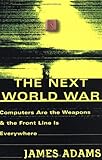The Next World War: Computers Are the Weapons and the Front Line Is Everywhere
The Next World War: Computers Are the Weapons and the Front Line Is Everywhere

It is a silent, invisible, and deadly weapons system. It can paralyze an entire nation without a single soldier being sent to war. We glimpsed its potential on television when surgical strikes on radar sites, electrical power plants, and command networks crippled Iraqi forces during the Gulf War. Now, in The Next World War, James Adams shows how a new chapter in military history is being written as the Information Age comes to the battlefield: to bigger and stronger, now add smarter. As increasingly sophisticated computers and microtechnology have become available, the concept of "conventional" warfare has changed. Technology has already made its way to the front lines: soldiers are now equipped, for example, with new "smart" technologies such as handheld computers that allow them to e-mail their commanders. There are devices that can sense an enemy's presence before the enemy is visible, by detecting body heat or by communication with satellites overhead. Robotic "bugs" can even be sent in swarms to sabotage weapons or subdue enemy soldiers. But the most significant and important use of information warfare won't be on the battlefield. The most devastating weapons will be those that target an enemy's infrastructure -- air-control systems, electrical grids, and communication networks, to name just a few potential targets. "Trojan horse" chips or viruses designed to accept and respond to commands from U.S. military intelligence can be installed in computers being sold overseas, making them vulnerable to attack. By hacking into computer systems, the United States could override programmed commands and thus shut down air traffic control systems, and open floodgates and bridges. Misinformation could even be broadcast, for example, by using imaging technology to simulate a television appearance by an enemy nation's leaders. This type of combat puts civilians at more risk than ever, as financial, communication, transportation, and other infrastructure systems become prime military targets. And information warfare puts the United States -- a nation increasingly dependent on technology -- in a position of both definite advantage and extreme vulnerability. In The Next World War, James Adams draws on impressive research as well as his lifetime of reporting on intelligence and military affairs to give us a chilling scenario of how wars will be fought in the new millennium -- and how much closer to home they might strike.Has the computer chip changed the nature of warfare? Will it eventually change war beyond current recognition? Adams, the former defense correspondent and Washington bureau chief for the London Sunday Times, believes that information will become the ultimate weapon and that future battlegrounds will be everywhere we live and work. While the weapons and technology of war will improve beyond even technofiction's expectations, it's the "information warfare" that will be critical in foreign wars and in the war against domestic crime.
We've already seen some of what is to come in the Gulf War's camera-equipped smart bombs. Soldiers can now be equipped with hand-held computers that can send messages and information back to superiors. And among the weapons to come: microwave cannons; plasma guns; devices that can see, smell, and hear; and even robotic "ants" that can swarm and explode around the enemy. Soldiers will wear uniforms powered by body heat that automatically relay important information back to their base camp. Helmets will be able to locate incoming fire, help a soldier see under all kinds of conditions, and locate others in a patrol.
The ability to attack an enemy's civilian infrastructure, such as communication networks, air traffic control, bridges and dams, and electric grids, will be part of the new era of war. With the advanced state of digital imaging, misinformation campaigns in enemy countries can take on a much more convincing role. All it takes is for one country to have a few skilled hackers, and suddenly the number of troops, the hardware, and the nuclear devices don't matter. Could there be an "electronic Pearl Harbor?"
Adams's research and journalism experience has made him aware of how much information warfare is being planned for and how much is already in place. His concern, in part, is that there has been little public debate about this, even though it affects our future so dramatically. Adams says "As David proved against Goliath, strength can be beaten. America today looks uncomfortably like Goliath, arrogant in its power, armed to the teeth, ignorant of its weakness." --Elizabeth Lewis

List Price: $ 23.95
Price: $ 14.44
Find More Computers Products
No comments:
Post a Comment